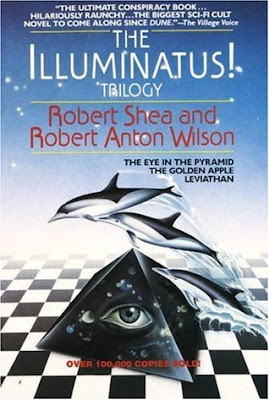It's time for another review of reviews! I'm still eagerly awaiting the announcement of this year's Hugo finalists so I can start this year's Hugo reading (although I'm taking a gamble by starting R. F. Kuang's Nebula-winning Babel, which is fantastic even if we improbably live in a universe where it won't be a Hugo finalist). While I'm waiting, I'm reading other books that are on my ever-increasing to-read list: The Regulators by Richard Bachman (aka, Stephen King), Schrödinger's City by Matthew Buscemi, and The Eye in the Pyramid by Robert Shea and Robert Anton Wilson. I guess the through-line here is that all three of these novels are pretty weird--and delightfully so. Just to mix it up, let's start with the one I finished last: The Eye in the Pyramid!
The Eye in the Pyramid by Robert Shea and Robert Anton Wilson
It's easy to forget in this age of QAnon and such, but conspiracy theories used to be fun. I was a big fan of The X-Files back in the 90's, and occasionally people would discover this and then tell me I should read the Illuminatus! trilogy. A few raved about it. At least one person said it was their favorite book (and maybe lived their life by it?). It always seemed like something I would check out, but for some reason never did (should I blame the Illuminati?). I bought a copy a few years ago, and recently I figured it could be some fun summer reading.
And it was! Reading this now is kind of like understanding a joke people have been telling for decades, everywhere from The KLF (confirmed by the Justified Ancients of Mummu and Wikipedia) to possibly the character Saul Goodman on Breaking Bad (unconfirmed, but after reading about all these conspiracies, I'm going to go ahead and say yes). I loved the riffs on conspiracy theories, philosophy, history, etc. that blur (if not obliterate) the line between real and imaginary (Lovecraft's Cthulhu mythos figures prominently, which amused me greatly). The larger theme between order and chaos is really interesting, and I see why Discordianism is a maybe-kinda real philosophy (somewhat like Pastafarianism is a kinda-sorta real religion). There is a plot. Sort of. But the narrative also jumps between minds, times, and places seamlessly--no help from things like sub-chapters or section breaks here. Did I always know what was going on? Of course not! But about ten pages in, I stopped worrying and learned to love the flow of words, ideas, and bonkers happenings.
This is a very 1970's US counterculture book from the sheer fun and literary experimentation to parts that have aged less well, like the 1960's San Francisco understanding of Buddhism and Daoism to the fact that almost every woman in the book, with a few exceptions, has little to add besides wanting to have sex with every man almost all the time (that may put off some 2023 readers, and I wouldn't fault anyone for it). There is some sort of haphazard indirect movement toward uncovering the deeper truths of the conspiracies involved (JFK, Atlantis, Freemasons, Illuminati, John Dillinger, porpoises, the Cold War, you name it). I'd be surprised if the next two volumes bring much in the way of traditional resolution, but this is simply not that kind of series. Still, if the next two are as entertaining and thought-provoking as the first book, I'm looking forward to reading them.
Next up: The Golden Apple!



No comments:
Post a Comment